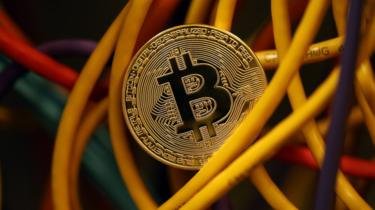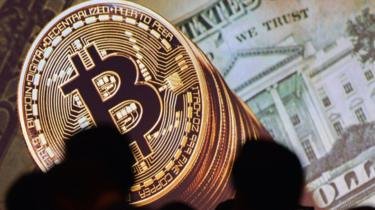Bitcoin: Should we care about its price?

On Wednesday, cryptocurrency Bitcoin fell by about 10% to a value of $15,800 (£11,810).
"It has plunged," a colleague said. "Should we do a story?"
Business journalists (or at least some of them) will debate passionately whether something is indeed a plunge, a dive, or merely a fall, a dip or a retreat. It's what makes us great company at parties.
And sure, a 10% movement downwards would usually fall into one of the more dramatic descriptions.
But to give it some perspective, Bitcoin dropping to $15,800 on 20 December took it to its lowest level since, well, 11 December.
On Wednesday, cryptocurrency Bitcoin fell by about 10% to a value of $15,800 (£11,810).
"It has plunged," a colleague said. "Should we do a story?"
Business journalists (or at least some of them) will debate passionately whether something is indeed a plunge, a dive, or merely a fall, a dip or a retreat. It's what makes us great company at parties.
And sure, a 10% movement downwards would usually fall into one of the more dramatic descriptions.
But to give it some perspective, Bitcoin dropping to $15,800 on 20 December took it to its lowest level since, well, 11 December.

Some argue the cryptocurrency craze is just a lot of hot air (yes, we know it is probably helium)
Nobody could accuse the media of ignoring Bitcoin and its rivals, at least not recently.
The BBC, like many others, has referred regularly to the skyrocketing price over the past year, including it almost doubling in value over the past month or so.
And it seems almost daily there is a legitimate news story: just this week there have been probes about insider trading,Bitcoin crime stories and people asking for Bitcoin as a wedding gift. to pick three at random from our website.
So there is little doubt cryptocurrencies have entered the mainstream consciousness and news agenda.
Both the currencies, and the technology behind them, seem sure to become more prevalent in the global economy.
The possibilities which that opens up, as well as the risks, is surely worth investigating.
Governments around the world are weighing in with their opinions on regulation. Some well-respected figures have warned that Bitcoin is a bubble that carries a big risk for investors.
These seem reasonable things to report, as well as reflecting the more optimistic point of view.
Meanwhile the trading of Bitcoin on a huge futures market such as the Chicago Mercantile Exchange is also interesting and worth covering, in that it marks a big step towards mainstream investing.
Snobbery?
But should we be reporting specifically on the price, where the news is essentially: price goes up, price goes down?
It is tempting because Bitcoin stories are popular. And some people do clearly want to know.
That list includes investors of course, and anyone wanting to buy, sell or just indulge in one of those "If only I'd invested five years/five months/five weeks ago" internal monologues.
If that is you, fear not. Plenty of services can tell you what the price of Bitcoin is doing right this second. The BBC tends to use Coindesk as its reference point.

There have been occasions when we decided the price was worth marking - most recently, for example, when it crossed the $10,000 threshold.
But is choosing not to report on what some see as significant on-the-day price movements a kind of cryptocurrency snobbery?
Well firstly, while we have currency market data pages using information bought from a third party, the BBC does not usually get involved in the nitty-gritty reporting of daily currency market movements.
And if we do write or broadcast about what the dollar, sterling and the euro are up to, it is only when somebody judges it editorially significant.
Sometimes it is when that movement is the result of some other newsworthy event (the sharp fall in the value of sterling after the Brexit referendum springs to mind).
And of course the value of established physical currencies still has far more impact on people's lives - be they running a business, have savings and investments, be going on holiday or indeed buying anything that has been made abroad.
Volatility
So after a bit of a discussion in the BBC's Singapore office, here are few reasons why we feel reluctant to do stories based on the price movements in Bitcoin and other cryptocurrency:
It is hugely volatile - which means these swings are the norm.
Because it is so volatile, the figures we refer to are massively out of date within seconds. Over the time it took to write this, the price has risen by about $500 - though I did stop to have a mince pie.
Despite the sudden growth in interest - the volume of Bitcoin being traded is still extremely low.
While the amount of coverage about this industry is increasing - and assuming more people decide to 'buy in' as a result, the number of people owning cryptocurrency is still very small. It is a tricky one to calculate, but a University of Cambridge study in August put the number at about three million.
The reasons for these sharp price rises and falls are often very unclear, so does reporting on price really tell us anything anyway?
Incidentally, at the time of writing on Thursday, Bitcoin has bounced back from that "plunge" of yesterday to above $17,100. Which is higher than it was 24 hours ago.
So no. I don't think we should do a story
Hi! I am a robot. I just upvoted you! I found similar content that readers might be interested in:
http://www.bbc.co.uk/news/business-42435995